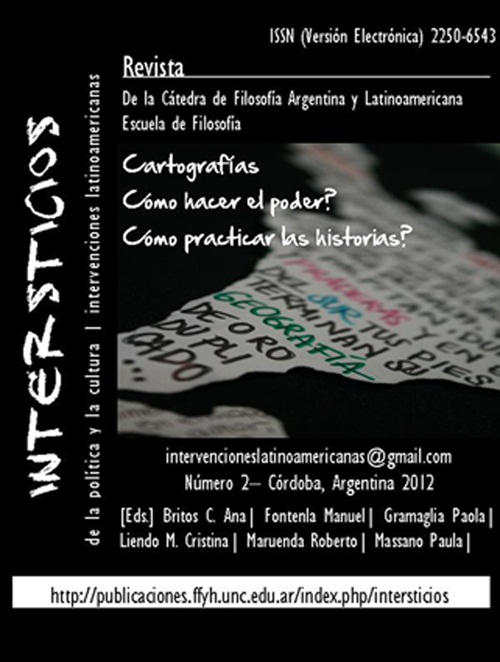Historias poscoloniales. Una discusión sobre el tiempo, la escritura y la política.
Abstract
Resumen:
“Discusiones”, tal es el título de esta sección. Y lo primero que se le puede ocurrir a uno, es que para una discusión debería, al menos, de haber dos interlocutores, dos perspectiva, dos argumentos contrapuestos, etc. No obstante, para las líneas que siguen me propongo otra forma de abordar el ámbito de la discusión, a saber, la interrogación.
La interrogación sin privilegios en su formulación como sin privilegios en su respuesta. Una interrogación capaz de sugerir otras, que permita ser reformulada en otros términos, y que a partir de dichas transformaciones, pueda dialogar, discutir, con sus otras posibles versiones, con sus otras posibles respuestas, las que surjan en esta Revista, en otros números, en otros encuentros, en otros espacios.
Y si bien a lo largo de este trabajo se recorrerán afirmaciones, defensas y una toma de posición, la intención no deja de estar puesta en la posibilidad de abrir más interrogantes que de cerrarlos. En este sentido y a modo de introducción el camino a desandar intentará llegar de la pregunta ¿Cómo pensar y practicar las historias poscoloniales?, a estas otras mucho mas especificas como ¿Por qué releer la historia de la Izquierda Nacional desde una perspectiva poscolonial? ¿Por qué volver nuevamente sobre el tema del colonialismo, para entender una historia que se escribió casi un siglo y medio después de la independencia y el fin de las experiencias de conquista en Argentina?, ¿En tanto que modelo interpretativo, que aporte puede realizar la perspectiva poscolonial?
A través de estas preguntas, intentare discutir algunas categorías y desplazamientos críticos, tanto para pensar la posibilidad de construir historias poscoloniales, como a su vez para releer críticamente distintos discursos histórico-políticos nacionalistas y anti-colonialistas de nuestra pasado latinoamericano.
Palabras claves: Historias poscoloniales, crítica epistemológica, discursos de la izquierda nacional.
Resumen:
"Discussions", such it is the title of this section. And the first thing that can come to the mind, is that for a discussion it should, at least, be two speakers, two perspective or two opposite arguments. Nevertheless, for the near lines I propose myself another way of approaching to the area of the discussion, namely, the interrogation. A kind of interrogation without privileges in his formulation, as without privileges in his response. An interrogation capable of suggesting others, which it should allow to be re-formulated in other terms, and that from the above mentioned transformations, it could compose in a dialogue, discuss, with his other possible versions, with his other possible answers, which arise in this Magazine, in other numbers, in other meetings, in other spaces. And though along this work will be crossed for affirmations and a take of position, the intention is not to close, but open the possibility of the emergency of any more questions.
In this respect and like as introduction the way to undoing will try to come from the general question “How to think and practice a poscolonial-history?”, to others more specify like: Why to reread the history of the “leftside nationalism” from a poscolonial perspective? Why to return again on the topic of the colonialism, to understand a history wrote almost one century and a half after the independence and the end of the conquest experiences in Argentina?, As an a interpretive model, what contribution can realize the poscolonial perspective?
Across these questions, I will try to discuss some categories and critical displacements, first to think the possibility of constructing poscolonial histories and, in second place, to do a critical re-read of different historical and political nationalistic and anti-colonialist narrations of our Latin-American past.
Key Word: Poscolonial Histories, epistemological critique, narratives of the “Nationalist Leftside”
Downloads
Downloads
Published
Issue
Section
License
Authors who have publications with this journal agree to the following terms:
a. Authors will retain their copyright and grant the journal the right of first publication of their work, which will simultaneously be subject to the Creative Commons Attribution License that allows third parties to share the work as long as its author and first publication in this journal are indicated.
b. Authors may adopt other non-exclusive license agreements for distribution of the published version of the work (e.g., deposit it in an institutional telematic archive or publish it in a monographic volume) as long as the initial publication in this journal is indicated.
c. Authors are allowed and encouraged to disseminate their work through the Internet (e.g., in institutional telematic archives or on their web page) after the publication process, which may produce interesting exchanges and increase citations of the published work (see The effect of open access).


